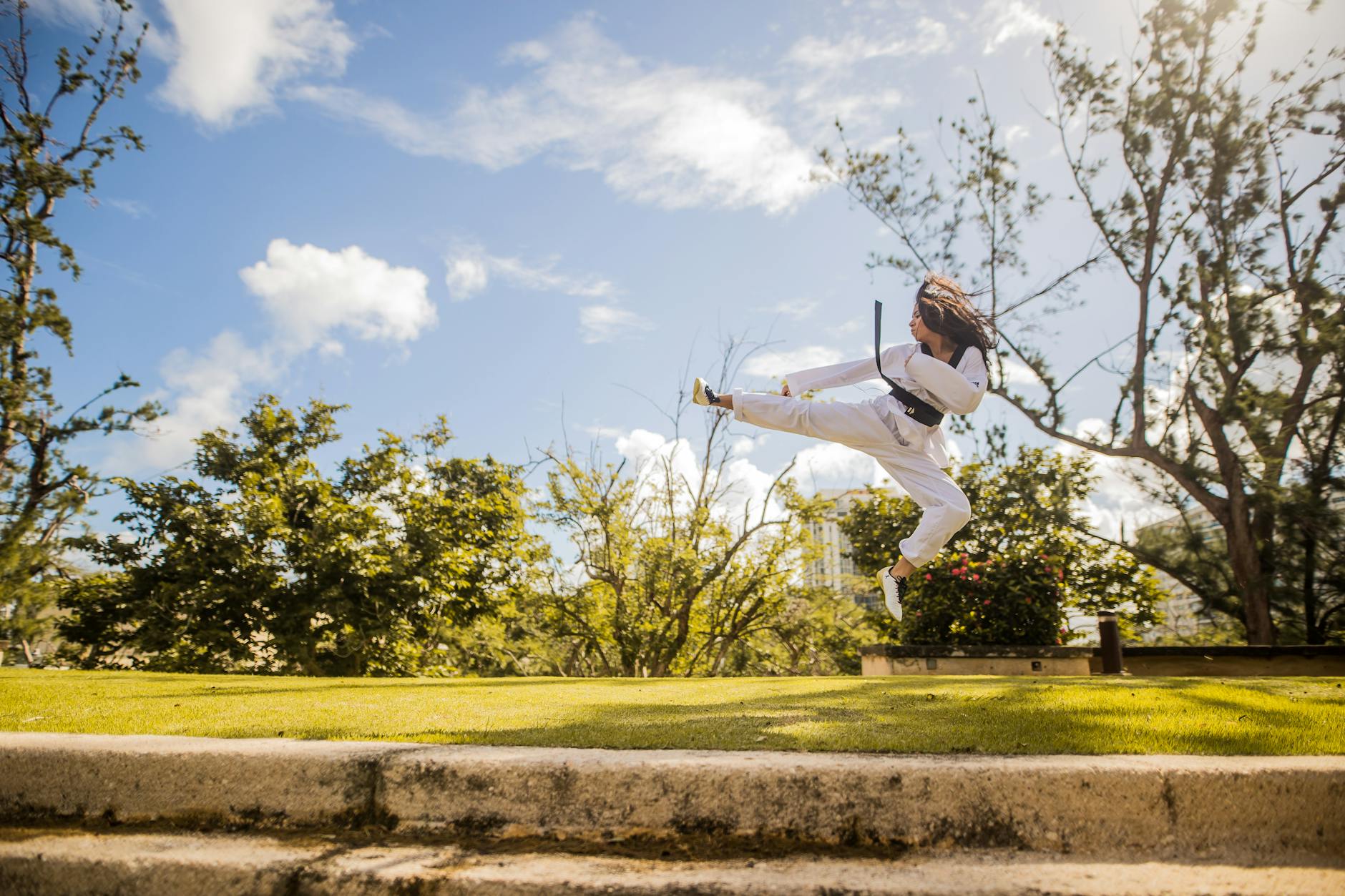How Karate Boosts Emotional Health in Teens: A Guide for Parents


Emotional health in teens can be emotionally overwhelming, filled with highs and lows. Parents often wonder: How does karate help mental health? This question leads to an important realization—karate is more than just a physical activity. It’s a practice rooted in mental martial arts, offering tools for emotional regulation, building confidence, and reducing anxiety. If you’re seeking a solution to support your teens with mental health problems, karate could be the key.
Understanding Emotional Health in Teens
Emotional health is crucial during adolescence, a time when teens experience significant physical, psychological, and social changes. Understanding the challenges they face and equipping them with tools to manage their emotions can make a lasting difference.
Teens with mental health problems in Adolescence
Adolescence is a time of profound change. Teens face academic pressures, social dynamics, and identity exploration, which can sometimes feel overwhelming. Emotional health is critical during this phase, and finding activities that support emotional well-being can make a significant difference.
Teens with mental health problems often grapple with anxiety, stress, or anger issues. Many parents ask: Does karate help with anger issues? Research suggests that martial arts for strength and focus can provide a healthy outlet for emotions, helping teens channel their energy constructively.
 Photo by cottonbro studio
Photo by cottonbro studio
Why Emotional Outlets Matter
Without healthy emotional outlets, teens may struggle with behaviors like mood swings or irritability. Structured activities like karate act as a pressure valve, teaching skills like emotional regulation and mindfulness. Parents frequently wonder: Is karate good for kids with anxiety? Studies show that martial arts can reduce anxiety by combining physical movement with mental focus, creating a safe space for teens to process their feelings.
How Karate Contributes to Emotional Well-Being
Karate is more than a sport—it’s a life skill. Beyond kicks and punches, it provides teens with tools to enhance their emotional health. It offers a unique mix of physical activity, discipline, mindfulness, and community support. Each of these elements plays a key role in nurturing emotional resilience, decreasing stress, and building self-confidence. Let’s explore how karate achieves this through different aspects of its practice.
Physical Activity and Emotional Release
Physical movement is a natural stress reliever, and karate provides an active outlet for teens to release pent-up emotions. During training sessions, they focus on repetitive techniques and high-energy drills, which help dissipate tension.
Ever notice how a workout can lift your mood? Karate works in much the same way. The intense physical activity releases endorphins, also known as “feel-good” hormones, that combat stress and anxiety. It also provides a controlled environment to express frustration or anger—whether it’s a sharp punch or a loud kiai (a karate yell), these actions have a cathartic effect. This emotional release supports healthy emotional expression rather than letting feelings boil over. This is why karate is considered one of the best martial arts for mental toughness.
Discipline and Self-Control
Karate emphasizes structured discipline and repetitive practice. Over time, teens develop the ability to set goals, follow through, and practice self-restraint. These lessons extend far beyond the dojo, fostering emotional stability and reducing impulsive behavior.
For example, when faced with challenges, a teen trained in karate learns to pause, reflect, and respond thoughtfully rather than reacting emotionally. They’re taught that patience and effort lead to growth—a metaphor that applies to life. The consistent routines in karate instill habits that can ground teens in the midst of emotional turmoil.
Building Self-Esteem and Confidence
Achieving a new belt or mastering a difficult move has a profound effect on how teens view themselves. Karate allows them to see tangible progress and celebrate personal achievements. This boosts their self-esteem and teaches them self-worth comes from inside, not from peer validation.
For teens struggling with body image or feeling inadequate, karate helps reshape how they see their abilities. Victory in karate isn’t about competing against others—it’s about personal improvement. With every skill gained, they feel stronger, more capable, and more confident in tackling life’s hurdles.
 Photo by Timur Weber (teens with mental health problems )
Photo by Timur Weber (teens with mental health problems )
Mindfulness and Focus through Karate
Karate isn’t just physical; it incorporates mindfulness practices that train the mind to stay present. Focus drills, such as perfecting stances or executing precise moves, require teens to tune out distractions and hone in on the task at hand.
Breathing techniques, often overlooked, play an integral role as well. Controlled breathing during routines calms the mind and steadies emotions, similar to meditation. This enhanced focus spills over into daily life. Whether managing stress before a big test or handling personal conflicts, teens with mental health problems learn how to center themselves and respond thoughtfully. Karate, in this way, becomes a mental workout as much as a physical one.
Social Connections and Support
Karate isn’t practiced in isolation; it thrives on community. Group classes give teens a chance to connect with peers who are also focused on self-improvement. These shared experiences foster a sense of belonging, combatting feelings of isolation or loneliness that many teens face.
Instructors also play a mentorship role, offering encouragement and guidance. Teens gain a support network that celebrates their progress and provides positive reinforcement. This connection, often rooted in mutual respect and team spirit, builds emotional resilience and reinforces healthy relationships.
Participation in karate connects teens with mental health problems to both a supportive community and a wider sense of purpose. It’s not just about individual growth but also about lifting others up—a valuable life lesson for emotional well-being.
Scientific Backing for Karate and Emotional Health
For parents wondering, Does karate help with emotional regulation?, the structured environment of karate provides clear answers. Teens learn patience, self-control, and respect, which positively influence their behavior at home and school.
Studies on Martial Arts and Mental Health
Several studies highlight the profound impact of martial arts on mental health, especially for teenagers. Research shows that martial arts training helps reduce symptoms of anxiety, depression, and stress, offering a meaningful intervention in mental well-being.
- A systematic review published in “BMC Psychology” (2019) revealed that martial arts training significantly reduces internalizing mental health problems like anxiety and depression. Participants in these programs reported better emotional regulation over time.
- A 2020 study from PubMed examined the effects of martial arts on teens and concluded improved resilience against stress and emotional challenges. By incorporating structured techniques and breathing exercises, teens showed lower stress hormone levels.
- A recent 2023 study on “The Impact of Martial Arts on Mental Health” demonstrated that martial arts improved mental health metrics such as emotional stability and reduced aggression, particularly in adolescent participants.
These findings underline how karate works as more than physical movement—it’s an evidence-based approach to supporting teens with mental health problems.
 Photo by cottonbro studio
Photo by cottonbro studio
Expert Opinions and Testimonials
Mental health professionals and seasoned karate instructors collectively affirm the role of karate in transforming emotional well-being. Their insights provide additional weight to existing research.
- Dr. Brian Moore, a mental health researcher, shared in his review: “Martial arts combine mindfulness and physical activity in a way that teaches emotional regulation. Teens not only develop discipline but also reduce stress through complex, focused movements.”
- Sensei Maria Rodriguez, a fifth-degree black belt and karate instructor for over 15 years, said: “Teens often arrive at the dojo with bottled-up anger or anxiety. Karate gives them a positive outlet where they learn respect, patience, and self-control.”
- Dr. Karen Stevens, a child psychologist, highlighted karate’s unique blend of physical and mental engagement: “The repetitive techniques in karate, paired with goal-setting like achieving belts, build self-confidence in teens. This self-belief often spills into other areas of their lives, creating a positive emotional cycle.”
Testimonials from teens and their families also echo these sentiments. Many report better emotional expression, fewer outbursts, and an overall improvement in mood after consistent martial arts practice.
What’s clear is this: karate offers a structured environment where teens grow emotionally and mentally, supported by expert guidance and evidence-backed methods. It equips them to face challenges with better composure, making it a powerful ally for emotional health.
Implementing Karate for Emotional Growth in Teens
Karate isn’t just about mastering punches and kicks. For teens with mental health problems, it can be a transformative experience that fosters emotional growth, builds resilience, and provides a positive outlet for stress. Choosing the right program, setting meaningful goals, and staying committed can make the practice even more impactful. Here’s how parents can guide this journey for their teens.
Choosing the Right Karate Program
Not all karate programs are created equal, especially when emotional development is a priority. How can you pick one that truly caters to your teen’s needs? Start by investigating the program’s philosophy.
- Look for Holistic Approaches: Programs that emphasize more than just competition often focus on personal growth. These may include teachings on mindfulness, self-control, and emotional awareness.
- Prioritize Positive Role Models: The instructor plays a pivotal role. Find a teacher who inspires confidence and encourages emotional expression while fostering respect and discipline.
- Check the Class Dynamics: Observe how students interact. Are there team-building exercises? A supportive atmosphere can help teens feel safe and valued.
- Ask for Recommendations: Other parents or online reviews can provide valuable insights.
A well-rounded karate program will balance physical training with lessons on emotional resilience, making it an ideal environment for your teen to thrive.
 Photo by Caleb Oquendo
Photo by Caleb Oquendo
Setting Goals and Expectations
For karate to benefit teens with mental health problems, they need clear and achievable goals. It’s like setting markers on a hiking trail—each step is progress and motivation to keep moving forward.
Here’s how to help your teen set and meet goals in their karate journey:
- Focus on Small Wins First: Whether it’s perfecting a stance or earning their first belt, small goals build momentum.
- Highlight Personal Growth: Help your teen understand that karate is about progress, not perfection. Encouraging effort over skill reduces unnecessary pressure.
- Celebrate Milestones: Acknowledge achievements, no matter how small. A positive word or a family celebration goes a long way.
- Encourage Open Communication: Discuss their feelings about their goals. Are they excited, nervous, or unsure? Being open strengthens self-awareness.
By equipping your teen with achievable goals, you’re offering them a framework to succeed—not just in karate, but in managing their emotions too.
Encouraging Participation and Commitment
Signing up is one step, but long-term commitment is where the real magic of karate happens. Sticking with it might be challenging for teens, especially when motivation dips. Here are ways to keep their interest alive:
- Create a Routine: Consistency is key. Designating specific days and times for practice makes karate a natural part of their week.
- Be Involved: Attend events or watch a class. Your presence shows that you’re invested in their journey.
- Connect Goals to Real Life: Talk to your teen about how karate skills—like focus or self-discipline—can help with school or personal challenges.
- Encourage Friendships: Building bonds with peers in the dojo motivates teens to keep showing up. A sense of community makes commitment easier.
- Be Patient but Persistent: Losing interest is common. A gentle nudge or a conversation about why they started can reignite their passion.
The goal is to turn karate into more than just an activity—it should feel like a personal mission your teen wants to pursue. Commitment teaches them that emotional growth takes effort but yields rewarding results.
Conclusion
Karate offers more than physical fitness—it’s a pathway to emotional growth and resilience. From reducing anxiety to building self-confidence, its benefits are profound. For parents seeking a way to nurture their teen’s emotional well-being, karate stands out as a powerful ally.
So, how karate boosts emotional health in teens is clear: it combines martial arts discipline with emotional mindfulness, providing teens with the tools to face life’s challenges confidently.
Is karate the right choice for your teens with mental health problems? The answer could lead to a healthier, happier future.

